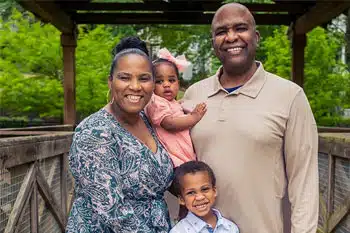
When considering adoption, some things to think about are: wait time, cost, legal concerns, children available, and medical history. Here, we go into detail about these five factors so that you can decide which type of adoption is best for your family!
Wait Times
How long it takes for hopeful adoptive parents to bring their child home through international vs domestic adoption depends on many factors.
International adoption waiting times vary depending on the service provider, country, and individual child involved. Certain countries have a better relationship with the United States than others. However, it typically takes up to five years to complete an international adoption.
If you’re adopting internationally, you wait for an agency to match you with a child and then wait again for international “red tape.” In addition, some countries have been known to change their foreign adoption requirements abruptly. Therefore, it’s important to research the country’s relationship with the U.S. and what they require to ensure your adoption experience goes smoothly.
If you’re adopting within the U.S., you will wait for a birth mother to choose you as the parents for her child. While we can’t speak for other adoption agencies, the estimated wait time for families adopting domestically with Lifetime Adoption is six to 18 months.
There are many factors to consider, including the couple’s openness in adoption preferences. For example, are they open to future contact with the birth family? Are they open to a variety of ethnicities? How open are they to substance usage?
The more open the hopeful adoptive parents are to certain circumstances, the more exposure their adoption profile will get, making their wait time shorter.
International Adoption Cost vs. Domestic
Domestic adoption costs range around $25,000 to $50,000. Whereas the international adoption cost jumps to $30,000 to $80,000.
There are additional costs unique to each type of adoption. Here’s an example: couples adopting with the U.S. don’t have to include the price of a visa in their adoption budget, unlike those adopting overseas. Also, those adopting overseas need to be prepared to travel to the country they’re adopting from and stay there for up to several weeks. They may be required to make multiple trips to the country as well. If you’re thinking about international adoption, thoroughly research travel requirements for the countries you’d like to adopt from.
If you’re adopting within the U.S., be prepared to travel to the birth mother’s state for the baby’s birth. After your baby is born, you’ll remain in the birth mother’s state until ICPC approval has been granted.
“ICPC” stands for the Interstate Compact on the Placement of Children, and it ensures that children placed into an adoptive family outside of their birth state get the right support services. In domestic infant adoption, odds are a birth mother won’t deliver in your state.
Legal Concerns
Hopeful adoptive parents seeking an international adoption should research the adoption process required by each country. Before the adoption is considered final, each country has its own set of legal mandates that must be met.
A common domestic adoption concern is the myth that the baby’s birth parents will come back years later and reclaim their child. Some believe that any future contact with the birth parents will result in the birth parents’ desire to withdraw their consent, even after the adoption is final. Since there’s usually no contact with the birth parents in international adoptions, many are led to believe that international adoptions are “safer.”
The truth is, once an adoption is legally finalized in U.S. court, the adoptive couple is recognized as the child’s parents. Post-adoption revocations are incredibly rare and usually because of unsafe legal practices. Additionally, these highly-sensationalized revocations are often media portrayals where birth parents are coming back for their child.
It can seem reassuring to adopt internationally, but those adoption horror stories make for good T.V. and are not reality.
Are There Children Available?
According to the Child Welfare Information Gateway, private domestic agency adoptions have steadily risen. In 2001, there were 49,945 agency adoptions in the U.S. By 2012, that number rose to 52,042.
As domestic adoptions continue to grow, international adoptions have undoubtedly been declining during the past several years. For example, in China, there were 2,231 adoptions in 2016. That number went down to 202 in 2020.
If you’re wanting to adopt a child of a specific, that often depends on the type of adoption you pursue. Typically, a domestic adoption will result in the adoption of a newborn or infant. However, children adopted internationally are often older than children adopted through domestic adoption agencies.
Medical History
The availability of a child’s medical history is one of the significant differences between domestic adoption and international adoption.
The medical records of children adopted overseas are usually minimal if they’re available at all. Therefore, it’s hard to find information about possible prenatal exposure to alcohol or drugs or other medical information. The effects of exposure are usually not recognized until after the child is placed with an adoptive family.
It’s also important to note that those adopting a child internationally should be prepared for attachment disorders. Often times in orphanages, children aren’t provide with regular care from a familiar person. So they might have a hard time forming a secure attachment with the adoptive parents.
In domestic adoption, the adoptive couple is usually provided the medical history of the baby and their birth parents. At Lifetime, we give the adoptive family the birth mother’s medical information to look everything over before they agree to a match. Then, the adoptive family can accept or deny the match based on the information in her medical history.
With a domestic adoption through Lifetime, you can choose the circumstances you’re comfortable with. For example, if an adoptive couple isn’t comfortable adopting a child who was exposed to alcohol in the womb, they won’t be considered for those situations.
Domestic vs International Adoption
If you’re questioning whether private domestic adoption or international adoption is best for your family, there is a wealth of information available online. Editor’s Note: This article was originally published on January 5, 2022, and has since been updated. Founder of Lifetime Adoption, adoptive mom, adoption expert, and Certified Open Adoption Practitioner (C.O.A.P). Since 1986, adoption expert Mardie Caldwell has been dedicated to bringing couples and birth parents together in order to fulfill their dreams. “Many years ago, I was also searching for a child to adopt. We didn’t know where or how to get started. Through research, determination, and a prayer, our dream of a family became reality. I started with a plan, a notebook, assistance from a caring adoption consultant and a lot of hard work; this was my family I was building. We had a few heartaches along the way, but the pain of not having children was worse! Within weeks we had three different birth mothers choose us. We were overwhelmed and delighted. Many unsettling events would take place before our adoption would be finalized, many months later. Little did I know that God was training and aligning me for the adoption work I now do today. It is my goal to share with our families the methods and plans which succeed and do not succeed. I believe adoption should be affordable and can be a wonderful “pregnancy” for the adoptive couple. I have also been on both sides of infertility with the loss of seven pregnancies and then conceiving by new technology, giving birth to a healthy daughter. I have experienced first-hand the emotional pain of infertility and believe my experience allows me to serve your needs better. It is my hope that for you, the prospective parents, your desire for a child will be fulfilled soon.”
We suggest that you do thorough research and investigate several domestic adoption agencies and international adoption agencies. In addition, investigate the international adoption cost vs. domestic so that you can make the best decision for your family.
727-493-0933.






0 Comments